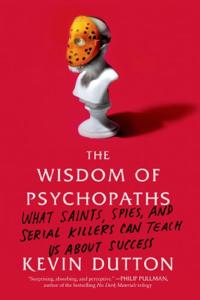
Want to learn the ideas in The Wisdom Of Psychopaths better than ever? Read the world’s #1 book summary of The Wisdom Of Psychopaths by Kevin Dutton here.
Read a brief 1-Page Summary or watch video summaries curated by our expert team. Note: this book guide is not affiliated with or endorsed by the publisher or author, and we always encourage you to purchase and read the full book.
Video Summaries of The Wisdom Of Psychopaths
We’ve scoured the Internet for the very best videos on The Wisdom Of Psychopaths, from high-quality videos summaries to interviews or commentary by Kevin Dutton.
1-Page Summary of The Wisdom Of Psychopaths
Overview
The word psychopath is associated with serial killers. These people are brutal and can keep a country in suspense until they’re caught.
Psychopaths are people who do horrible things. They feel no remorse, and they can be very brutal. Many people wonder what makes a psychopath tick, where their brutality comes from, and how someone could commit such crimes without feeling any shame whatsoever.
There are similarities between people who will never become murderers and psychopaths. Psychopaths have a disregard for the well-being of others, as do some executives and bankers. They take what they want even if it harms others, which is similar to how those other individuals operate in their fields.
While many people believe that successful leaders are very different from psychopaths, the truth is that they have a lot in common. Psychopaths are fearless, and their fearlessness helps them achieve power and prestige in our chaotic world. A scientific analysis of several politicians shows that some of the traits associated with psychopathic killers can also be found more frequently among successful politicians than among convicted criminals.
The Wisdom of Psychopaths explores the question of what makes psychopathic people successful. It examines how they differ from other people and why they’re so good at certain things. The book also looks at what each of us can learn from them for our own advancement in life.
Big Idea #1: Psychopaths are often intelligent and charming. They have no fear, which makes them good at certain things.
Psychopaths are generally violent criminals who we hope have been caught and put behind bars. However, most psychopaths aren’t murderers or rapists; they’re actually successful people. Psychopathy is characterized by a lack of empathy and remorse, but that doesn’t mean all psychopaths are bad people. In fact, one to two percent of the population could be labeled as “psychopaths.”
Psychopaths are good at winning people over because they’re charming, engaging and entertaining. They can be so convincing that others don’t see the evil side of them. Because psychopaths occupy high positions in society, it’s no surprise that many of them become professors, executives or surgeons.
Psychopaths are intelligent and lack emotions like fear, shame, and guilt. Their brains don’t function normally because they have abnormalities in the areas that determine emotions. Psychopaths stay cool in situations where others would worry.
In the past, fear was an important emotion because it helped people survive. Today, however, when there are fewer dangers to be afraid of and we don’t need to worry about being eaten by saber-toothed tigers anymore, the ability not to experience fear can help us succeed.
Psychopaths rarely hesitate to take a risk. If they want something, they simply do it without fear of failure. This can lead them to prison or powerful positions in finance and politics.
Big Idea #2: Psychopaths make decisions without feeling or morals.
Psychopathy and utilitarianism are similar in that they both focus on the greatest good for the most people. Utilitarianism focuses on maximizing happiness, so it’s a little different from psychopathy because psychopaths don’t care about other people.
Non-psychopaths also take utilitarian actions in certain situations, but they deviate from the choice that would provide the greatest possible gain. This is illustrated by a task given to psychopaths and non-psychopaths where they must solve moral dilemmas.
There are two scenarios. In the first scenario, you see a train heading towards five people and you have to throw a switch so that it goes on another track where only one person is standing. The second scenario calls for you to push a fat man off of a bridge in order to save five people who would otherwise die if he falls into the water below.






